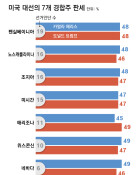Information Agency Chief Accuses Media of Mistranslation
Information Agency Chief Accuses Media of Mistranslation
Posted May. 31, 2007 03:57,
The media has wrongfully reported that all U.S. government agencies have reporters rooms, by mistranslating the press rooms in the U.S. as reporters rooms, Kim Chang-ho, head of the Government Information Agency (GIA), said on Wednesday during a radio interview.
Government agencies and committees, whose functions are similar to the GIA, exist worldwide, Kim added.
Although Kim countered the calls for abolishing the GIA, most experts view his remarks as lame excuses.
The press room is a space where public officials stay to assist journalists or to place materials, Kim said on the day of the PBC current affairs radio show: Open World Today, I am Lee Seok-woo.
He claimed that although the press rooms in the U.S. is a space designated for government officials who support news coverage activities, the media is misguiding the public by wrongfully translating them as reporters rooms in Korean.
If the media has reported that all U.S. government organizations have reporters rooms by mistakably mistranslating the name, it is still problematic. However, if the media mistranslated it intentionally, such a moral hazard would be difficult to tolerate, Kim said, expressing his strong discontent against the media. (News) transmission rooms cannot be found in many advanced nations.
Kims remarks are in line with the remarks President Roh made on Tuesday.
However, the White House and major U.S. ministries, such as the State Department, the Pentagon and the Department of the Treasury, run the press rooms designated for reporters to write or transmit articles, along with the briefing rooms. In the case of the White House, it provides a news transmission room for registered journalists. Major broadcasting companies are also provided with a separate space equipped with transmission equipment. In Japan, almost all the government agencies, including the Prime Ministers Office, provide rooms for reporters. Even many European countries, which have strong parliamentary systems, run the so-called press gallery, for reporters.
Many experts also point out that Kims remark that government bodies or committees whose functions are similar to the GIA are commonly found worldwide is not consistent with fact.
They claim that government agencies similar to the GIA, whose main objective is the promotion of the administration, can be found only in Middle Eastern countries where democracy has not yet taken root, such as Iraq, Kuwait and Saudi Arabia or South East Asian countries with political instability. Former Iraqi President Saddam Hussein appointed an information minister to promote the legitimacy of his regime over the 24 years of his dictatorship.
In countries where democracy is deep-rooted, such as the U.S. and Japan, a separate ministry that exclusively promotes the administration does not exist as each ministry is responsible for its own promotion. The Federal Press and Information Office in Germany, which Kim stated as an exemplary model, is different from the GIA, which controls the media and restricts news coverage activities, in terms of function and role.
Organizations similar to the GIA are a product of propaganda systems such as those used to amass public opinion during WWII in Germany. Advanced democratic countries did not have a government body which would centralize the promotion of the government, Sohn Tae-gyu, professor at Daekook University, said
The GIA, which spearheaded the measure for press-room integration, has given yet another poor briefing. When Kim briefed the results of the cabinet meeting at the joint briefing room, situated in the Central Government Complex, on Tuesday, it was apparent that no improvement had been made. He read the outlines of the bills decided during the meeting and enforcement ordinance. When asked about details, he answered, Related ministries will make separate announcements.
ysh1005@donga.com







